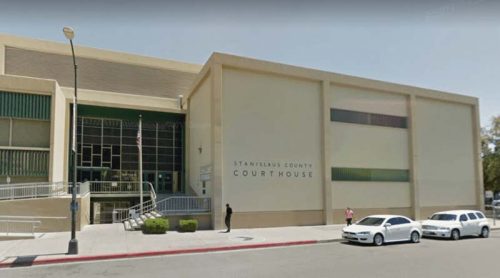
By Helen Shamamyan
MODESTO, CA – A man accused of committing arson at the back of a store had his last day of a jury trial here in Stanislaus County Superior Court late last week, and his public defender argued there was reasonable doubt as to the accused’s guilt under the law.
Before Judge Jeff Mangar, the deputy public defender told the jury testimony against the accused, as well as video surveillance presented days prior, left it unclear whether or not the accused was actually responsible for the fire or if he started it “willfully or maliciously.”
The DPD reminded the jury the burden of proof lay with the prosecution in criminal cases, asserting evidence presented by Deputy District Attorney Travis Colby was not convincing beyond a shadow of a doubt that her client was guilty of arson.
During her closing statement, the DPD recounted how the store clerk recognized the accused on the day of the incident, as he was a regular, and was not alarmed by his presence in the store, although he testified to noticing that the accused seemed to be under the influence of something.
The only instance when the clerk said he became suspicious of the accused was when someone in the store notified him a fire that had started.
Although, when giving his testimony, the clerk, said the DPD, was already referring to the accused man as “the perp,” meaning the key witness was immediately assuming his guilt before the accused was even convicted.
Additionally, the DPD referenced footage that shows the accused walking up to the fire, after which a security guard tackles him. The footage was allegedly from too long of a distance away to make out clear details of who lit the fire and who was in the direct area of the scene, as well as whether whoever ignited the flames did it intentionally or it occurred by accident.
The DPD expressed fears the jury would perceive the trash fire that occurred posed a potential safety hazard and, regardless of whether or not her client accidentally was responsible for it, will convict him of a guilty verdict of arson “just in case.” At the very most, the accused, if presumed to be responsible for the fire, should be charged for a careless mistake, said the defender.
The DPD addressed holes in witness testimony and the lack of solid foundation regarding the accused’s responsibility in the fire and his motive of malice and intent if he, indeed, was the one to ignite the garbage pile by the store.
The defender said if her client was an arsonist, it was not likely that he would have gone back to the scene of his crime, and the footage of him walking up to the fire could mean just that he was in the wrong place at the wrong time.
The DPD shared a story told to her by a fellow colleague regarding circumstantial evidence, and how it can leave gaps in a particular story that cannot be filled without making personal assumptions, a process of speculation that could potentially claim its own victims.
The defense then asserted to the jury, “We can’t just fill in gaps with circumstantial evidence if it’s not strong enough… these videos are not strong enough.”
In his testimony, the security guard who tackled the accused affirmed that nothing was said from either person during their encounter at the scene of the blaze, but that he “stopped” the accused because he saw him walking towards the fire.
In his closing argument, DDA Colby argued the incident could not possibly have been an accident and that it was surely the accused because, in his tousle with the security guard who tackled him, a “portable removable ignition device” fell away from the accused’s possession.
However, during her statement, the DPD addressed the lighter in the accused’s possession, asserting “it’s not illegal to own a lighter.”
The defense noted the security guard who tackled the accused affirmed that nothing was said from either person during their encounter at the scene of the blaze, but that he “stopped” the accused because he saw him walking towards the fire.
At this point in the trial, the accused had not offered to testify in court, and the jury was to begin deliberations.




